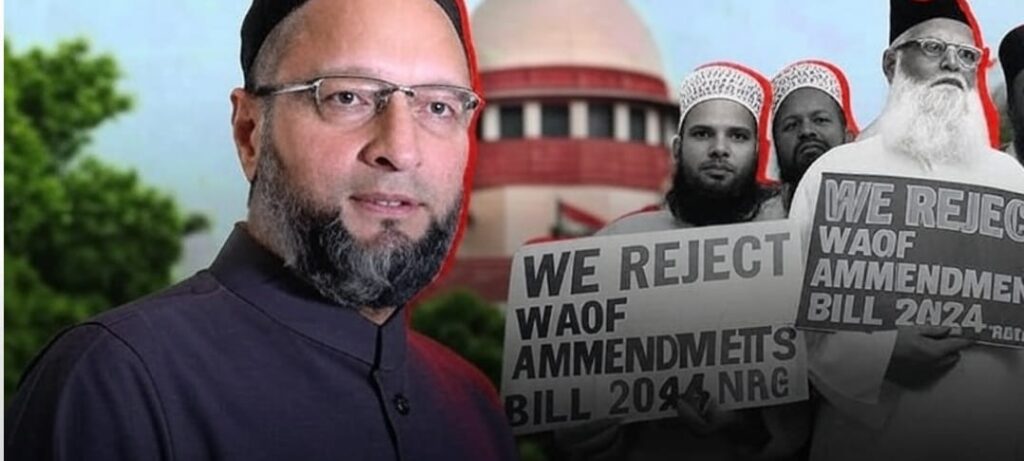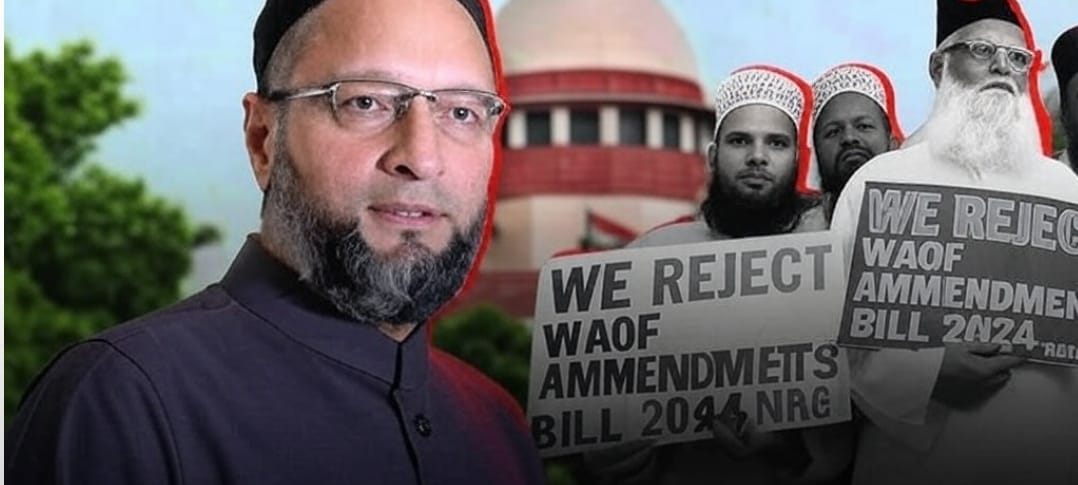
The recently enacted Waqf (Amendment) Bill, 2025 has landed before the Supreme Court of India, with prominent leaders from the Opposition calling it a “direct violation of fundamental rights” and a “targeted legislative strike” on the Muslim community’s religious autonomy.
AIMIM Chief Asaduddin Owaisi, in his petition, stated that the Bill “brazenly violate[s] the fundamental rights of Muslims and the Muslim community,” adding that it “imposes structural constraints that strip Waqf Boards of their autonomy and reduce Muslim participation in religious endowment governance.”
Congress MP Mohammad Jawed also filed a writ petition in the Supreme Court, claiming that the Bill places “arbitrary restrictions” on Waqf properties and their management.
According to the petition filed through Advocate Anas Tanwir, the legislation “discriminates against Muslims by imposing restrictions that are not present in the governance of other religious endowments.”
The Bill passed the Rajya Sabha with 128 votes in favour and 95 against on April 4, following its passage in the Lok Sabha a day earlier with 288 members supporting it and 232 opposing.
Key Amendments and Points of Contention
The Bill amends the Waqf Act, 1995, now renamed as the Unified Waqf Management, Empowerment, Efficiency, and Development Act.
The government claims it aims to “modernise and streamline” the functioning of Waqf institutions. But opposition leaders allege that the provisions are deeply intrusive.
Among the most debated amendments are:
- End of ‘waqf by user’: Only persons who have “practiced Islam for at least five years and are legal owners” of a property can now declare it as Waqf. This effectively removes customary waqf dedications based on long-standing communal use.
- Restructured Central Waqf Council: The requirement that all members be Muslims is diluted. The Bill mandates that “at least two members shall be non-Muslims”, which has raised eyebrows of the members of the community and also gives room to the questions about the religious composition and authority of the body overseeing Islamic charitable properties.
- Centralised audits: The Bill empowers the Central Government to direct the CAG or other officers to audit Waqf accounts by superseding the authority of State Governments.
- Appeals to High Courts: The amended law allows “any person aggrieved by a Tribunal’s decision to appeal to the High Court within 90 days,” removing the finality of Tribunal decisions under the earlier Act.
- Gender inclusivity clause: While critics acknowledge a positive step in ensuring that “at least two Muslim members of the Central Waqf Council must be women”, they argue that this does not outweigh the broader dilution of community control.
- Recognition of sectarian boards: The Bill allows separate Waqf Boards for groups like the Aghakhanis and Bohras, which some interpret as a divide-and-rule tactic.
Congress’s Legal Strategy
Jairam Ramesh, senior Congress leader and party strategist, declared on social media platform X:
“The INC will very soon be challenging in the Supreme Court the constitutionality of the Wakf (Amendment) Bill, 2025. We are confident and will continue to resist all assaults of the Modi Govt on the principles, provisions, and practices that are contained in the Constitution of India.”
He added that the party has consistently pursued legal remedies against “unconstitutional excesses” of the government, citing past challenges to the Citizenship (Amendment) Act, 2019, amendments to the Right to Information Act, and the Conduct of Election Rules, 2024.
Government’s Stand
In defense of the Bill, government sources maintain that the amendments are designed to “prevent misuse, increase accountability, and ensure equitable development of Waqf assets.” The inclusion of non-Muslims and women, they argue, reflects a push towards “inclusivity and transparency.”
A senior official in the Ministry of Minority Affairs while speaking on condition of anonymity has said:
“There has been rampant misuse and political capture of Waqf Boards in several states. These amendments are not anti-Muslim; they are pro-reform.”
The Constitutional Debate Ahead
The Supreme Court’s decision in Owaisi v. Union of India could determine how far Parliament can go in restructuring religious institutions without violating Article 25 (freedom of religion) and Article 26 (rights of religious denominations) of the Constitution.
Legal scholars are closely watching the case, with some cautioning that the amendments may fail the “reasonable classification” test under Article 14 if they impose conditions unique to Muslim charitable trusts.
As the constitutional bench prepares to hear the matter, the legal, political, and social reverberations of the Waqf (Amendment) Bill, 2025 are expected to echo for months — perhaps even years — to come.
CASE TITLE: ASADUDDIN OWAISI VS. UNION OF INDIA| WP(C) 176837/2025
REFERENCES:

